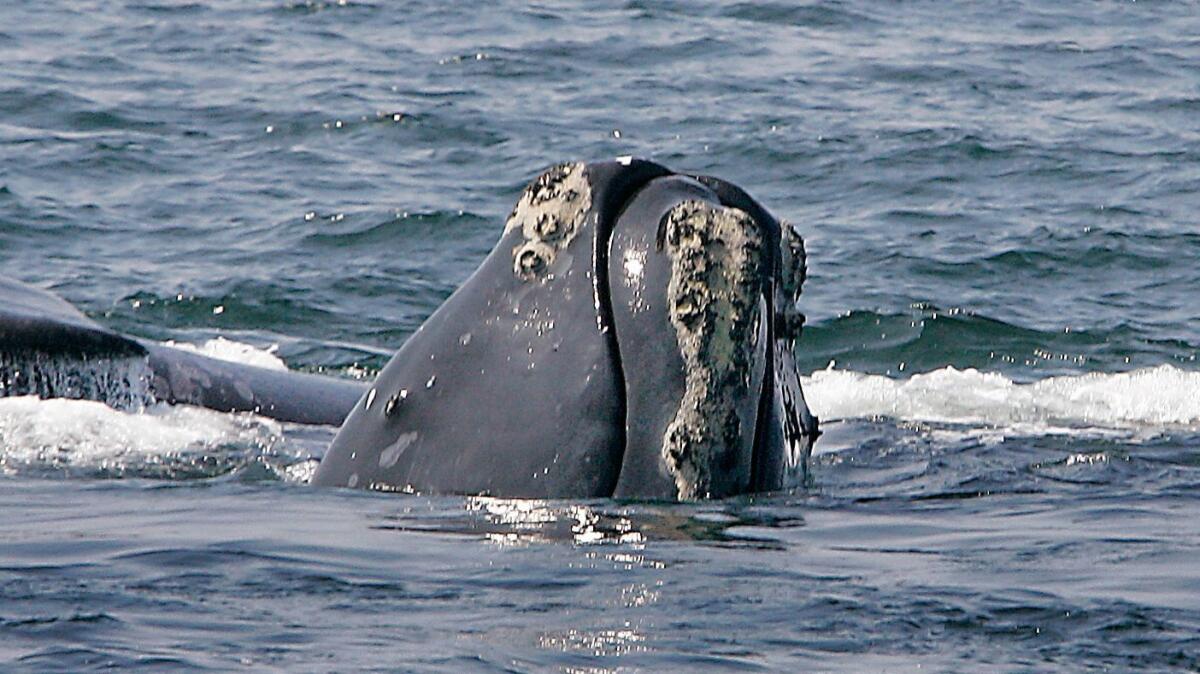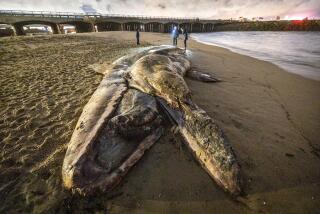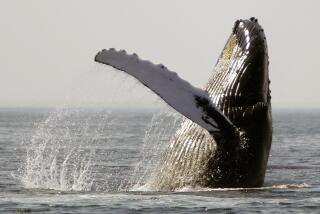Government warns that North Atlantic right whales could become extinct

Reporting from Portland, Maine — Officials with the federal government say it’s time to consider the possibility that endangered right whales could become extinct unless new steps are taken to protect them.
North Atlantic right whales are among the rarest marine mammals in the world, and they have endured a deadly year. The National Oceanic and Atmospheric Administration has said there are only about 450 of the whales left and 17 of them have died in 2017.
The situation is so dire that American and Canadian regulators need to consider the possibility that the population won’t recover without action soon, said John Bullard, the northeast regional administrator for NOAA Fisheries. The high year of mortality is coinciding with a year of poor reproduction, and there are only about 100 breeding female North Atlantic right whales left.
“You do have to use the ‘extinction’ word, because that’s where the trend lines say they are,” Bullard said. “That’s something we can’t let happen.”
Bullard and other NOAA officials made the comments during a Tuesday meeting of the regulatory New England Fishery Management Council. Mark Murray-Brown, an Endangered Species Act consultant for NOAA, said right whales have been declining in abundance since 2010, with females hit harder than males.
The U.S. and Canada must work to reduce the human-caused deaths of the whales, Murray-Brown said. Vessel strikes and entanglement in fishing gear are two frequently cited causes of the whales’ deaths.
“The current status of the right whales is a critical situation, and using our available resources to recover right whales is of high importance and high urgency,” he said.
The animals give birth in temperate southern waters and then head to New England and Canada every spring and summer to feed. All of this year’s deaths were off New England and Canada.
Some recent scientific studies have shed some light on why whale deaths have ticked up. One, published in the journal Nature Scientific Reports, stated that the whales move around much more than previously thought. Some scientists have posited that whales might be venturing outside of protected areas in search of food, putting themselves in harm’s way.
In another study, published last month in the journal Endangered Species Research, scientists examined right whale feces and found whales that suffer long entanglements in fishing gear produce hormone levels that indicate high stress. The stress negatively affects their ability to reproduce even when they survive entanglement, scientists said.
“My colleagues are trying to find solutions so we can find out how they can continue to fish, but not entangle whales,” said a study co-author, Elizabeth Burgess, an associate scientist with the Anderson Cabot Center for Ocean Life at the New England Aquarium in Boston.
A five-year NOAA review of right whales that was released in October said the animals should remain on the endangered list. It also included recommendations to protect the species. They included developing a long-term plan for monitoring the population trends and habitat use, and studying the effect of commercial fishing on right whales.
More to Read
Sign up for Essential California
The most important California stories and recommendations in your inbox every morning.
You may occasionally receive promotional content from the Los Angeles Times.










